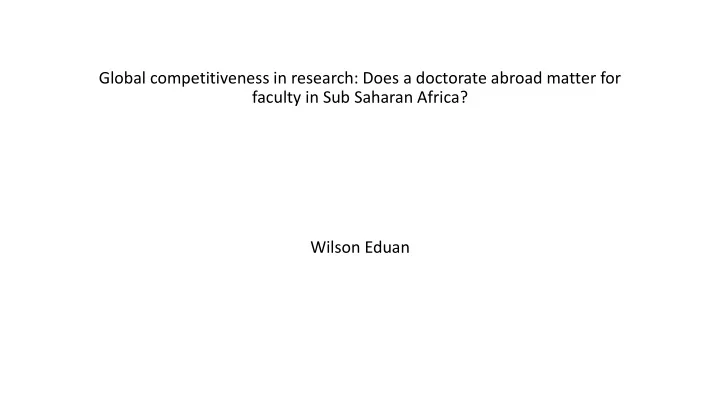

Global competitiveness in research: Does a doctorate abroad matter for faculty in Sub Saharan Africa? Wilson Eduan
Rationale Competition for World class Two approaches: Incentives vs Study Abroad SS Africa depends much on study abroad Are they globally competitive following return?
Purpose To assess progress on global engagement in research of foreign doctorates years after they return to country of origin. Engagements in research will include: o Publications o Projects o Collaboration o Conferences o Funding o Affiliations
Context Competition in Research not new (Cold war space programs) Universities and HE faculty as new entrants Unbalanced global stage o Top 500 Universities o Best 15 funded countries in each region compared (Table 1) Unbalanced local context - Uganda o faculty o funding o Infrastructure
Literature on factors affecting research engagements Demographics (age, gender, marital status, citizenship, etc.) Research Context shapes outcomes: o reward system vs productivity o academic discipline vs productivity o country size vs collaboration o links with industry vs publication and collaboration o funding vs publications o cosmopolitanism vs conferences o Industry vs collaboration o publication vs collaborations. Little about study abroad and global competitiveness in research.
Methodology Using modified Global Engagement Model (Figure 1) o Study abroad outcomes are dependent on demographics, context and or correlation among outcomes. o Outcomes for Research: International Publications, Projects, Collaboration, Conferences, Affiliations and Funding. o Context: Education, academic discipline, and demographics (age, gender) 170 CVs from the Uganda NCHE covering 2009-2014 (Table 2). Retrospective/causal comparative design (foreign and domestic doctorates). Longitudinal Curriculum Vitae Analysis (LCVA) method (Each Count for outcome was coded under year of occurrence). GEE method (baseline and split category analysis).
Results Annually, 3.82 times access to international funding for foreign doctorates. Surprisingly, no significant differences under; publications, conferences, collaboration, affiliations and projects (Table 4). Significant differences were found under: Funding for PhD (4.36 times) and postdoc favors domestic under projects and conferences (Table 5) Funding for Soft disciplines (2.92 times) and affiliations in the Hard disciplines (Table 6) Funding for male faculty than for female faculty (Table 7) Other research dimensions had no significant differences even with split data analysis
Discussion Funding dimension suggests preference to work at a global level that could be linked to the study abroad influence. No significant differences in Affiliation suggests reduced interest overtime as a result of no immediate links with consultancy. Weak in international publications. Greater consultancy could affect publications. Sponsor interests first. No significant differences in collaboration. Could also be attributed to consultancy. Collaboration is highly correlated with publication. Conferences often attract basic research than consultancies. Affiliation is a highly significant factor. Postdocs with domestic PhD even perform better. No significant difference in projects though domestic PhD appear to perform better. Possible linkage to projects while at PhD and continuity with supervisors.
Implications Support for PhD and postdoc abroad Improving faculty welfare Setting minimum on engagements. Funding Research Centers Alumni contact and mentorship
Limitations and further study CVs are often designed for purposes other than research. Challenging when dates are missing.
Recommend
More recommend